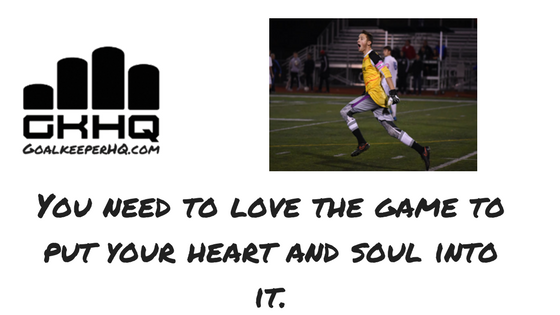There was a story in the sports news in England the other week (March 2015 ) about a young professional goalkeeper who had given up the game to become a used car salesman. The article is here, . This article has been updated as I saw that Lee Butcher, the goalkeeper I used to coach and highlighted in the article [The importance of a good first touch from a back pass] has recently been talking about giving up the game to be a train driver. [See article here]
The L1 Goalkeeper Glove business I have created has also brings to my attention the many young, hopeful goalkeepers trying to make a go in the professional game. Our sponsored professional, Mason Stajduhar, who has been involved in the National Team, and made the MLS Home-Grown All Star game, has had to move from his home in Orlando to Tulsa in search of regular games. At times, even being fustrated there.
The articles hit home as I gave up playing at the age of 25. It takes a lot of energy to be on top of your game and although we love the game and the position of goalkeeper, it is not a nice place to be when you are not respected or wanted by your team. For the young man in the first article, the prospect of short term contracts and hunting around for a club was too much hassle. It is important to persue your dreams of playing the highest level possible, and it is ok to be out of your comfort zone until you become acclimatized to that level, but if you are constantly playing at a level in which you are doing your team more harm than good thus loosing the respect of your team mates, you get yelled at by your coach and you are not enjoying the experience then there is nothing wrong with stepping down a level so you can be enjoy the game and experience and be an important part of the team. Most importantly, the increased success will help you to love the game again.
Throughout my coaching years, I have seen tell tale signs of players that are falling out of love with the game. It breaks my heart that my passion for the game and the position of goalkeeper is not always shared, but players have many things going on in their life.
Here are some tell tale signs:
- Inconsistent or below par performances in practice
- Lack of motivation / energy levels
- No interest in the sport outside of playing ( Not watching the game )
- Uncooperative or disagreeable with coach or team mates
- Frequent complaints of vague, nonspecific muscle or joint pain
- Slower recovery from injuries ( See article on dealing with injuries where players may enjoy the pressure being off )
- Getting sick more often
It is important that the player and their support system are aware of some of the reasons that you can fall out of love with the game. Here are some I have seen:
- The level of play is too high to get personal success. Leading to criticism from team mates or coach
- The team does not experience success and the player can not identify personal successes
- Parental pressure to play at a certain level and criticism of performance
- Pain of playing, through injuries / putting body on the line becomes more than the pleasure.
- Trying to do too many things – Additional sports, academics, friends, family activities.
Players that love the game and have a passion to improve will be doing the many of the things labeled on the article “what will get me top marks from a psychological evaluation”. Namely,
- Prepare correctly
- Deal with mistakes the correct way
- Great work rate
- Watch the game outside of their own involvement
- Ask questions
- Practices outside of official team team or goalkeeper training
Feel free to share any experiences or help me add to the above lists.
